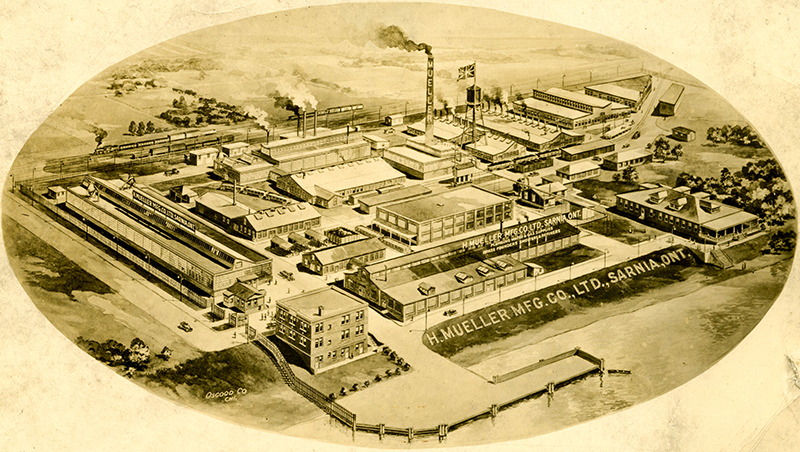Phil Egan for The Sarnia Journal
(2017) It began with the promise of new jobs and ended with accusations of fraud and prison terms.
The brief but tawdry history of the Pendergast Fence Company was front-page news in Sarnia in 1922 and 1923.
The sad saga began with a happy announcement from the Chamber of Commerce that the Pendergast Fence Company would shortly be established in Sarnia, with the company manufacturing both plain and barbed wire fencing for sale directly to the consumer.
Farmers, especially, were delighted to hear of a new fence supplier selling at prices that eliminated an agent or middleman. The company would be capitalized with $100,000 worth of stock and lease a building at the southern end of Sarnia’s H. Mueller Manufacturing Company, creating six to 10 jobs.
The plant was in operation by March and producing 12 to 15 tons of wire fencing an hour. Company president Maurice D. Pendergast was enthusiastic about his firm’s prospects, predicting production would soon quadruple.
Product from the Pendergast Fence Co. was shipped across Ontario and eastern Canada, and there was talk of adding a second 10-hour shift, with rumours of the imminent arrival of a second loom to double production.
Everything looked rosy to the outside world, but inside the company was in turmoil. By the end of 1922, as a result of undercapitalization and less than stellar management, it was technically insolvent. Maurice Pendergast left for the United States in the spring of 1923 to search for new financing.
Before he left, however, the directors made a fatal mistake. With bills piling up from suppliers such as Consolidated Steel, Cambria Steel and United States Steel Products, the shipment of raw materials ceased. The plant was forced to cease production and shipments of finished fencing slowly ground to a halt.
Simultaneously, an aggressive new advertising campaign offered low pricing and urged customers to buy before prices increased.
It worked. Orders flooded in – $24,000 in new business over the next five months. But it wasn’t enough.
Customers wrote letters complaining they hadn’t received their fencing. They got back form letters promising delivery soon, but nothing happened.
The authorities were notified and an investigation began. In October of 1923, president Maurice D. Pendergast, vice president Austin C. Smith, and director Judith Pendergast were charged with conspiracy to defraud the public.
Following a lengthy trial that December, Maurice Pendergast and Austin C. Smith were found guilty and received prison terms of twelve to eighteen months, and six months, respectively. Judith Pendergast was acquitted.
It was a sad chapter in Sarnia’s business history.


